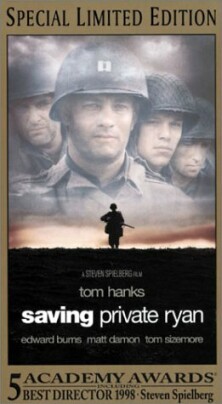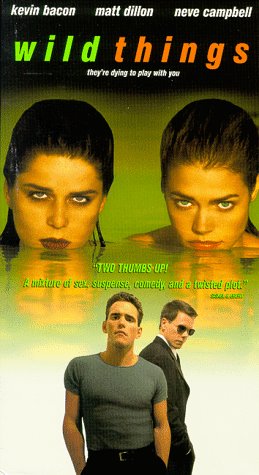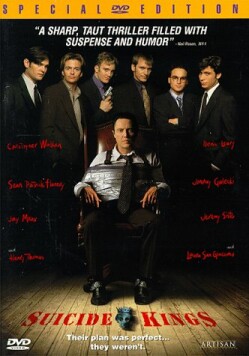Saving Private Ryan
It’s time that the team of computer programmers from IBM who developed “Deep
Blue,” the machine that beat the world chess champion, Gary Kasparov, to take on
a real challenge. Let them try to develop a movie-making program that is more
formidable — or more machine-like — than Steven Spielberg. His latest
directorial effort, Saving Private Ryan, is as usual a brilliant
demonstration of movie-making. At the level of the individual shot it is just
about perfect. Also as usual, the film considered as a dramatic whole is utter
nonsense. Fortunately, not much thought is involved in it. For it is when the
unbeatable movie-making machine has to think that it starts to whirr and pop and
smoke until finally it shuts down altogether.
The mystery about Mr. Spielberg, and the reason why he seems so machine-like,
lies in the answer to the question of why he goes on making movies — since,
apart from the fact that he is programmed to do so, there seems no point to any
of them. The nearest he comes to identifying the rationale of Saving Private
Ryan, which deals with a rescue mission aimed at finding and retrieving an
American paratrooper in Normandy who is now the sole survivor of four brothers,
comes when the gruff, no-nonsense Sergeant Horvath (Tom Sizemore) says that, in
later years when they look back on their part in the war, Ryan’s rescuers will
think that “Maybe saving Private Ryan was the one decent thing we managed to
pull out of this whole godawful mess.” So much for having defeated Hitler’s
dream of world conquest!
Such a line in context is even more ridiculous, because the film itself does
such a good job of presenting to us the human cost of the war. We must suppose
that it was all for something even before the brass decided that Ryan
(Matt Damon) should be sent home to his mommy. There are some serious moral and
philosophical problems raised by the mission, to be sure. Can it be justified to
take away some of the vital troops necessary to the larger purpose of winning
the war for the sake of a bereaved mother in Iowa? But Spielberg pretty much
ignores such questions after the scene in which General Marshall (Harve
Presnell) rules in favor of the rescue. Instead he has his hero and the leader
of the rescue mission, Captain John Miller (Tom Hanks), talking about having to
square his conscience by reckoning that for each man under him who is killed
ten, or twenty or thirty others will be saved.
This too is obvious nonsense. No one goes to war to save lives (rather,
because some things are more precious than life), and it is a catastrophic
misstep for Spielberg to put such words in Miller’s mouth — a failure of
imagination as total as the successes he has enjoyed in so many of the movie’s
details. How could he make such a mistake? Because, I think, accounting for his
characters’ actions is for him just another trick of the trade. He himself has
no views one way or the other on why men go to war. It has probably never even
occurred to him that it is an interesting question, philosophically. He just
retrieves a bit of superficially plausible dialogue to cover the hole from his
capacious, fully-searchable data base of movie-making methods and
techniques.
Which is not to say that most of these techniques do not work impressively
well. Perhaps the most impressive comes with his portrayal in the film’s
opening passage of the landing at Omaha beach as seen by Miller and his men. Of
course there is lots of blood and body parts being blown off before our eyes,
the quick-cutting confusion of battle and the fear on the faces of the men.
Those are given. But what makes it special are the little Spielbergian touches
which extend beyond the visible to the audible — the variation between
defeaning noise outside and its muted quality in underwater shots, for example.
For a moment we are presented with the possibility of sanctuary from the
murderous machine-gun fire on the beach — only to see it snatched away again
in a moment as men are being shot and blood spurting from them even under
water.
More variation in sound comes with scenes purporting to represent the
numbness inside the head of Miller, where the immediacy of battle and the
imminence of sudden and violent death suddenly both seem a long way away. We
have the sense of a momentary and irrelevant refusal by the body to respond to
such overwhelming stimuli, and we switch back and forth between Miller’s point
of view and that of the omniscient and indifferent god of battle who accepts all
the sacrifices without a single moment of human sympathy. One is aware, as one
would hardly be if one were actually there, of the constant jingle of the brass
bullet casings as they are ejected by machine guns, and, paradoxically, the
sound makes us feel as if we are there. As the fierce struggle for the
beachhead dies down, the camera pulls back to show us one of the three dead
Ryans lying face down in the sand — in the midst of half a dozen dead fish.
The fish are another nice, Spielbergian moment.
One could go on. There is scarcely a scene in the entire two hours and forty
minutes that does not yield its riches — to the point where one becomes
vaguely aware of and annoyed by such effortless mastery of cinematic
illusionism. Oh yes, we think during a shot in which rain falling on leaves is
mixed up with and finally gives way to the patter of rifle fire, here is yet
another excellent bit of movie-making. But the fact that we are thinking of it
as movie-making makes the trick somewhat counterproductive. Thus we are more
than usually alert when Miller announces to one James Ryan that his brothers are
dead. This, we realize, cannot be what it seems to be. Ryan weeps. Miller’s
squad of battle-hardened veterans, including those most skeptical about the
mission, look on and seem if only for a moment to feel sympathy. Of course it is
the wrong James Ryan. This Ryan’s brothers are boys still in grammar school. The
men turn away to resume their search, and Ryan calls to Miller: “Does this mean
my brothers are OK?”
It is yet another touch of the Spielbergian magic. But when the magic becomes
too profuse and too predictable — and when it comes without any persuasive
dramatic context — we must withhold from it the accolades that would be
accorded to half as much skill shown by those who are better dramatists, if much
lesser masters of filmic technique.
Discover more from James Bowman
Subscribe to get the latest posts to your email.








